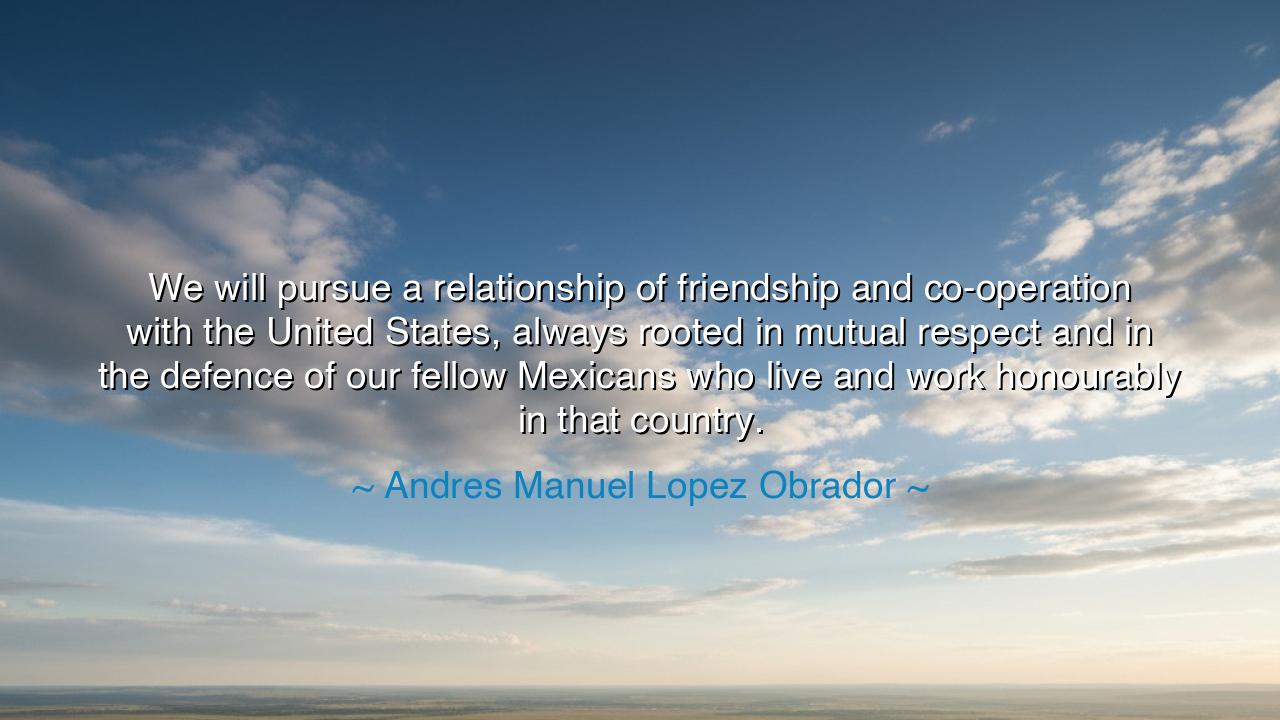
We will pursue a relationship of friendship and co-operation with
We will pursue a relationship of friendship and co-operation with the United States, always rooted in mutual respect and in the defence of our fellow Mexicans who live and work honourably in that country.






"We will pursue a relationship of friendship and co-operation with the United States, always rooted in mutual respect and in the defence of our fellow Mexicans who live and work honourably in that country." — Andres Manuel Lopez Obrador
In the grand tapestry of human history, where nations rise and fall, and relationships are forged and tested by the winds of change, there exists a powerful truth: friendship and co-operation between nations, like the bonds between individuals, are rooted in mutual respect. Andres Manuel Lopez Obrador speaks not only of political alliances but of something deeper—an understanding that, at its core, every relationship, whether between nations or individuals, thrives best when it is founded on the principles of dignity, honor, and shared purpose. In a world where borders often divide and differences are accentuated, the pursuit of friendship must always be guided by the noble ideals of equality and respect.
To pursue a relationship of friendship between Mexico and the United States is to recognize the shared history, intertwined destinies, and common goals of both peoples. Throughout history, the bonds between nations have been tested by both conflict and peace. The Roman Empire, at its height, understood the importance of alliances, seeing the value in establishing friendships even with those who were once considered enemies. In doing so, Rome ensured its dominance through diplomacy and mutual benefit. Yet, like all great empires, the strength of Rome's influence came not only from its military might but from its ability to foster relationships grounded in mutual respect, whether it was with the Germanic tribes or the great empires of the East. In the same vein, Lopez Obrador’s words speak to the idea that respect must be at the heart of every international bond if it is to last and prosper.
Consider the example of Franklin D. Roosevelt and Lázaro Cárdenas, the leaders of Mexico and the United States during a pivotal moment in history. In the early years of World War II, despite political and economic challenges, the two leaders found common ground in the defence of their people and the shared goal of securing peace in the Americas. Roosevelt’s Good Neighbor Policy and Cárdenas’ vision of economic sovereignty for Mexico were built upon mutual respect and the shared understanding that the well-being of the people—whether they were Mexican workers in the U.S. or Americans—was paramount. Their cooperation, based on the recognition of each nation’s sovereignty and the importance of unity, is a shining example of how respect between nations can result in positive, lasting change.
Lopez Obrador speaks not only of the importance of mutual respect in the relationship between Mexico and the United States but also of the defence of fellow Mexicans living and working in the United States. This is not a mere political stance; it is a deeply human appeal, rooted in the principle that no person, regardless of their nationality or place of birth, should be denied their human dignity. The plight of Mexican immigrants has been a source of deep emotional and political tension, but defending them is not simply about protecting borders—it is about ensuring that every human being is treated with honor, respect, and fairness. This principle resonates with the timeless wisdom of Marcus Aurelius, who believed in the universality of human rights and the importance of protecting the dignity of all people, regardless of their station in life.
The relationship between Mexico and the United States is one of interdependence. The Mexican diaspora in the U.S. is vast, with millions of Mexicans contributing to the economy, culture, and society of their adopted home. These workers, who labor with honor and integrity, are often the silent backbone of industries ranging from agriculture to construction. To defend them is not simply to protect a political or national interest—it is to recognize their humanity, their role in the shared human experience. In this, Lopez Obrador calls for a shift in how we view immigration—not as a problem to be solved but as a complex issue that requires understanding, empathy, and respect for the individuals involved.
In today’s world, where national boundaries often seem to divide rather than unite, the lessons of mutual respect and cooperation are more crucial than ever. Lopez Obrador’s call to pursue a relationship of friendship between Mexico and the United States serves as a reminder that strength is found not in separation, but in unity. The most powerful relationships—whether between individuals or nations—are those built on shared values, mutual support, and the unshakable belief that all people deserve dignity and respect.
The lesson to carry forward is simple but profound: the foundation of any enduring relationship, be it personal or political, must be mutual respect. Seek to understand those with whom you share this world, whether they live next door or across borders. Stand firm in the defense of others, not because they are "ours" or "theirs," but because their humanity is sacred. Embrace the vision of a world where cooperation prevails over division, where respect becomes the bedrock of all relationships, and where we recognize that we are all, in the end, interconnected. Whether in our personal lives or in our relationships with other nations, let mutual respect guide our actions, and let friendship and cooperation be the forces that drive us forward.






AAdministratorAdministrator
Welcome, honored guests. Please leave a comment, we will respond soon